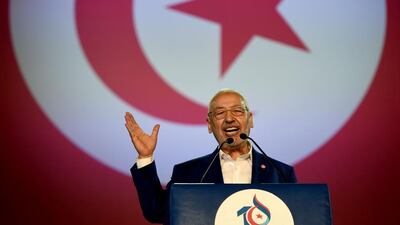A Tunisian judge has ordered the freezing of the bank accounts and financial assets of Rached Ghannouchi, the former speaker of the dissolved parliament and the founder of the Islamist party and movement Ennahda.
The order by the judge — who works on counterterrorism cases at the Court of First Instance — also applied to Moaz Ghannouchi, the eldest son of Mr Ghannouchi, as well as his son-in-law and senior Ennahda member Rafik Abdessalem, a former foreign minister, the official news agency TAP reported.
The judge has notified the Tunisian Financial Analysis Commission (CTAF), which is affiliated to the Justice Ministry, of the order.
Former prime minister Hamadi Jebali and seven other people are also on the judge’s list. No other names were mentioned in the TAP report.
Mr Jebali, who chaired an Ennahda-led government from 2011 to 2013, was a former secretary general of the movement, before leaving it in 2014. It is not clear whether he has rejoined Ennahda.
Ennahda leader Ghannouchi, who co-founded the movement in the late 1960s, has publicly tried to distance the movement from the Muslim Brotherhood in the aftermath of uprisings in a number of Arab countries in 2011.
Mr Jabali is under investigation for alleged money-laundering in relation to foreign funds transferred to a Tunisian charity. He was detained for several days last month before being released. He has denied the charges.
He is set to appear before an antiterrorism court on July 20.
The court had already imposed a travel ban on Mr Ghannouchi in May amid an investigation into allegations that he was linked to a secretive cell accused of carrying out high-profile political assassinations in 2013. He has dismissed the allegations as politically motivated.
After the overthrow of president Zine El Abidine Ben Ali more than a decade ago, Ennahda emerged as the largest political party in Tunisia.
Its popularity has waned over the years as political rivalries with other parties in more than eight successive governments since 2011 failed to deliver long-awaited improvements in living conditions.
It staunchly opposes the measures taken by President Kais Saied last year, chiefly the dissolution of Parliament and the writing of a draft constitution, which is planned to be put to a public referendum on July 25.
In May, the Islamist movement and other secular, leftist and centrist parties announced the formation of an umbrella opposition group called the National Salvation Front.


